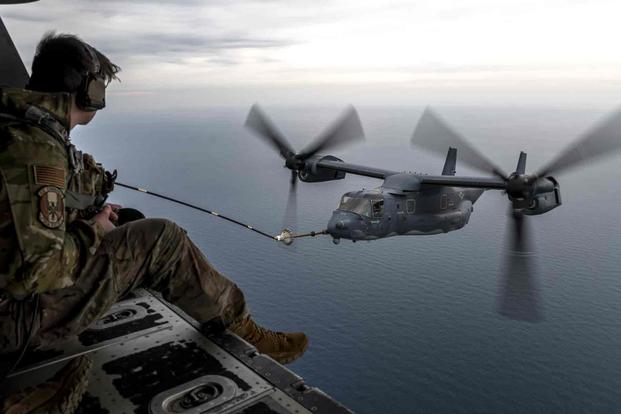NATIONAL HARBOR, Maryland -- Air Force officials told Military.com that they remain confident in the CV-22 Osprey amid recent deadly crashes, some of which have been attributed to an elusive ongoing mechanical issue.
A Marine Corps Osprey crashed in Australia last month, killing three Marines; the cause is still being investigated. Additionally, another Marine Corps Osprey went down last year in Southern California, claiming the lives of five Marines. Findings revealed in July showed the cause of that crash was a hard clutch engagement, a mechanical issue that has plagued the military for more than a decade.
But the Air Force, which uses the aircraft for special operations missions, remains dedicated, committed and confident in the aircraft, officials said.
Read Next: First Female VA Deputy Secretary, a Retired Army Officer, Is Confirmed by Senate
"These are fellow crew members that we've trained with in the past, so it always hits home. Our condolences remain with them," Brig. Gen. Michael Conley, the Air Force Special Operations Command director of operations, told Military.com in an exclusive interview last week. "We remain confident in the aircraft."
Likewise, Lt. Gen. Tony Bauernfeind, the commander of AFSOC, told reporters during a media roundtable Tuesday that the command is following mitigation steps issued over the last year.
"We're very confident in the mitigation steps that we've done," Bauernfeind said. "With respect to the CV-22 at large, it is answering a long-held requirement and that no other capability can answer in the special operations community as we go forward."
Their remarks also echo votes of confidence from elsewhere in the Defense Department.
Two weeks ago, Pentagon spokeswoman Sabrina Singh told reporters at a press briefing that "we do certainty have confidence in the Osprey."
Singh also stressed that "each incident undergoes its own investigation" and she didn't want to "apply a sweeping broad stroke across every incident linking them together."
"They're all very unfortunate," she said.
An ongoing persistent mechanical issue -- a hard clutch engagement, often referred to as HCE -- is capable of shredding the components responsible for powering the Osprey's propellers and enabling it, in the event of a single engine failure, to keep flying.
The issue became public only after the Air Force abruptly grounded its Osprey fleet last August over a cluster of such incidents. Yet the Marine Corps, which operates the lion's share of the military's Osprey fleet, said the very next day that it didn't need to ground its aircraft.
Officials who spoke with reporters at the time stressed that the issue largely occurred "within seconds after takeoff" and that "in every incident, the aircraft landed safely."
Months later, though, Military.com would exclusively report on a 2017 clutch incident with an Air Force Osprey that happened mid-flight and forced the aircraft to perform an emergency landing with a single engine.
In June 2022, a Marine Corps Osprey -- call sign Swift 11 -- crashed in southern California, claiming the lives of five Marines. In March, the Marine Corps investigation found that they were the first deaths stemming from the problem. The branch didn't tell the victim's families or the public until July.
In February, when the military announced that replacing the input quills would be a mitigation measure put in place to stop the issue from happening, officials wouldn't say how often the replacement would need to take place or how many Ospreys would be down as a result.
When the Swift 11 investigation was released, it became known that the quills were being replaced every 800 flight hours. However, that investigation also revealed that the Marine Corps does not know the definitive cause of the issue. The document reviewed by Military.com says that the entire "in-reporting" Osprey fleet has now been retrofitted.
Despite the absence of an understanding of what causes the issue, the Marine Corps says replacing the quills is a near-perfect, 99% fix. A widow of a Marine killed in the Swift 11 incident, as well as aviation experts, told Military.com they were skeptical of this claim.
But AFSOC officials claim that Air Force pilots and their families have not raised concerns about the CV-22 regarding the latest findings of the Swift 11 or the recent Australia crash.
Following the Swift 11 findings that a hard clutch engagement was to blame for the June 2022 deaths, AFSOC held a town hall to address the report. But Bauernfeind said he has not heard worries from pilots or their families.
"I have not heard from any family members who are expressing any safety concerns," Bauernfeind said. "I have had a widow that contacted me, based on recent events, based upon an accident we had back in 2010. I've had conversations with the widow and just giving her updates on where we're at and that was a private conversation."
The Marine Corps and Air Force officially started flying the Osprey in 2007 and 2009, respectively. The Navy got its first operational aircraft more recently, in 2021, according to fact sheets from all the services.
Fast-forward to when the fiscal 2024 budget documents came out for all the services earlier this year, and something becomes clear: The military is done buying the aircraft.
The latest budget documents, released in March by the Navy, say that the military services ultimately want 464 aircraft -- 360 for the Marines, 48 for the Navy, and 56 for U.S. Special Operations Command and the Air Force.
"We've had the CV-22 for coming up on two decades," Bauernfeind said. "So, we're pivoting to the future of what will be replacing the CV-22."
-- Thomas Novelly can be reached at thomas.novelly@military.com. Follow him on Twitter @TomNovelly.
-- Konstantin Toropin can be reached at konstantin.toropin@military.com. Follow him on Twitter @ktoropin.
Related: Marine Corps Widow Pushes Back After Claims Deadly Osprey Malfunction Is 99% Fixed











